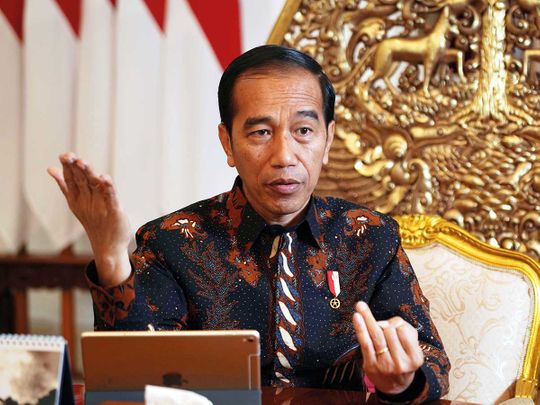
JAKARTA: Indonesia will move its capital to the eastern edge of jungle-clad Borneo island, President Joko Widodo said on Monday, as the country shifts its political heart away from congested and sinking megalopolis Jakarta.
The proposed location — near the regional cities of Balikpapan and Samarinda — is an area at “minimal” risk of natural disasters, where the government already owns some 180,000 hectares of land, he added.
“The location is very strategic — it’s in the centre of Indonesia and close to urban areas,” Widodo said in a televised speech.
“The burden Jakarta is holding right now is too heavy as the centre of governance, business, finance, trade and services,” he added.
The announcement ends months of speculation about whether Widodo would follow through on the long-mooted plan — it was floated by the newly independent country’s founding father Sukarno more than half a century ago.
Shifting from problem-plagued Jakarta would also transfer Indonesia’s power base off Java island, where about half of the sprawling archipelago’s 260 million people live.
“Moving the capital off Java is a gesture that aims to solidify unity,” said Jakarta-based political risk analyst Kevin O’Rourke.
“Jakarta will continue to be a megacity — as a centre for finance and commerce — for a few more decades, but ultimately it is at severe risk to climate change,” he added.
A bill for the proposed move will now be presented to parliament, Widodo said.
Building is set to begin next year with the move of some 1.5 million civil servants slated to begin by 2024, at a cost of 466 trillion rupiah ($33 billion, Dh121.1 billion), officials said.
Orangutans, mining
Known as Kalimantan, Indonesia’s section of Borneo — the island it shares with Malaysia and Brunei — is home to major mining activities as well as rainforests, and is one of the few places on Earth with orangutans in their natural habitat.
Environmentalists expressed concerns the capital city move could threaten endangered species.
“The government must make sure that the new capital is not built in a conservation or protected area,” said Greenpeace Indonesia campaigner Jasmine Putri.
The region has also been blanketed in choking haze from annual forest fires that ravage vast swathes of land.
“That makes Kalimantan unfit as a candidate for a new capital city,” said Jakarta-based urban planning expert Nirwono Joga.
“And the move won’t necessarily free Jakarta of problems like flooding, traffic jams and rapid urbanisation,” he added.
Concerns have soared over the future of Jakarta — a city nicknamed ‘the Big Durian’ after the pungent, spiky fruit that deeply divides fans and detractors.
Built on swampland, the city is one of the fastest-sinking cities on earth, with experts warning that one third of it could be submerged by 2050 if current rates continue. The problem is largely linked to excessive groundwater extraction.
But the city of 10 million — a number that bloats to about 30 million with surrounding satellite cities — is also plagued by a host of other ills, from eye-watering traffic jams and pollution to the risk of earthquakes and floods.
Indonesia is not the first Southeast Asian country to move its capital. Here's a look at some others.
NIGERIA:
Africa's most populous country moved its capital in 1991 from teeming Lagos to Abuja, a planned city built in the 80s that was more central and less congested.
AUSTRALIA:
Australia's purpose-built capital Canberra became official in the late 1920s as a compromise between rivals Sydney and Melbourne, which both dwarf its modest population of about 400,000.
PAKISTAN:
Pakistan moved its seat of government from Karachi on the far southern coast to the purpose-built city of Islamabad in the 60s. The new capital, developed by a Greek architect, is known for its greenery and quality living standards.
MYANMAR:
Myanmar shifted its capital from Yangon to central Naypyidaw in the mid-2000s. The sprawling city has almost six times the land area of New York. It boasts a replica of Yangon's Shwedagon Pagoda and a 20-lane highway, although they're often empty as the city is sparsely populated.
BRAZIL:
Brazil started moving its capital to Brasilia from Rio de Janeiro in 1960. Acclaimed for its large-scale modernist architecture, the city was designated a UNESCO World Heritage Site in 1987.
KAZAKHSTAN:
Kazakhstan's capital Astana - recently renamed Nursultan after its ex-president - became the country's administrative centre in 1997, taking the crown from Almaty. Designed by a Japanese architect, the city is known for its futuristic skyline.
EGYPT:
Egypt is planning to move to a new administrative capital being built in the desert some 45 kilometres (28 miles) from the centre of overcrowded Cairo, a city of nearly 20 million.












